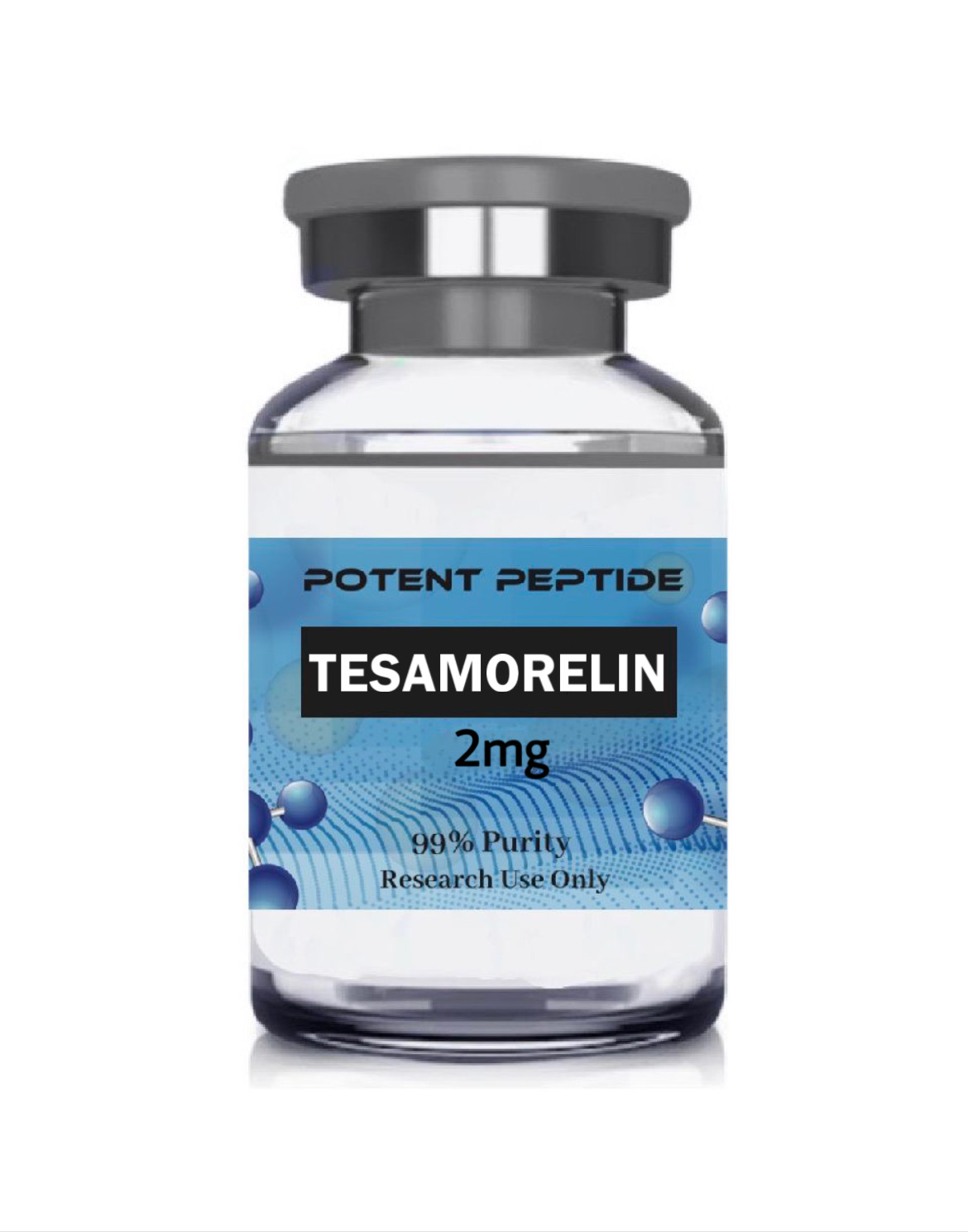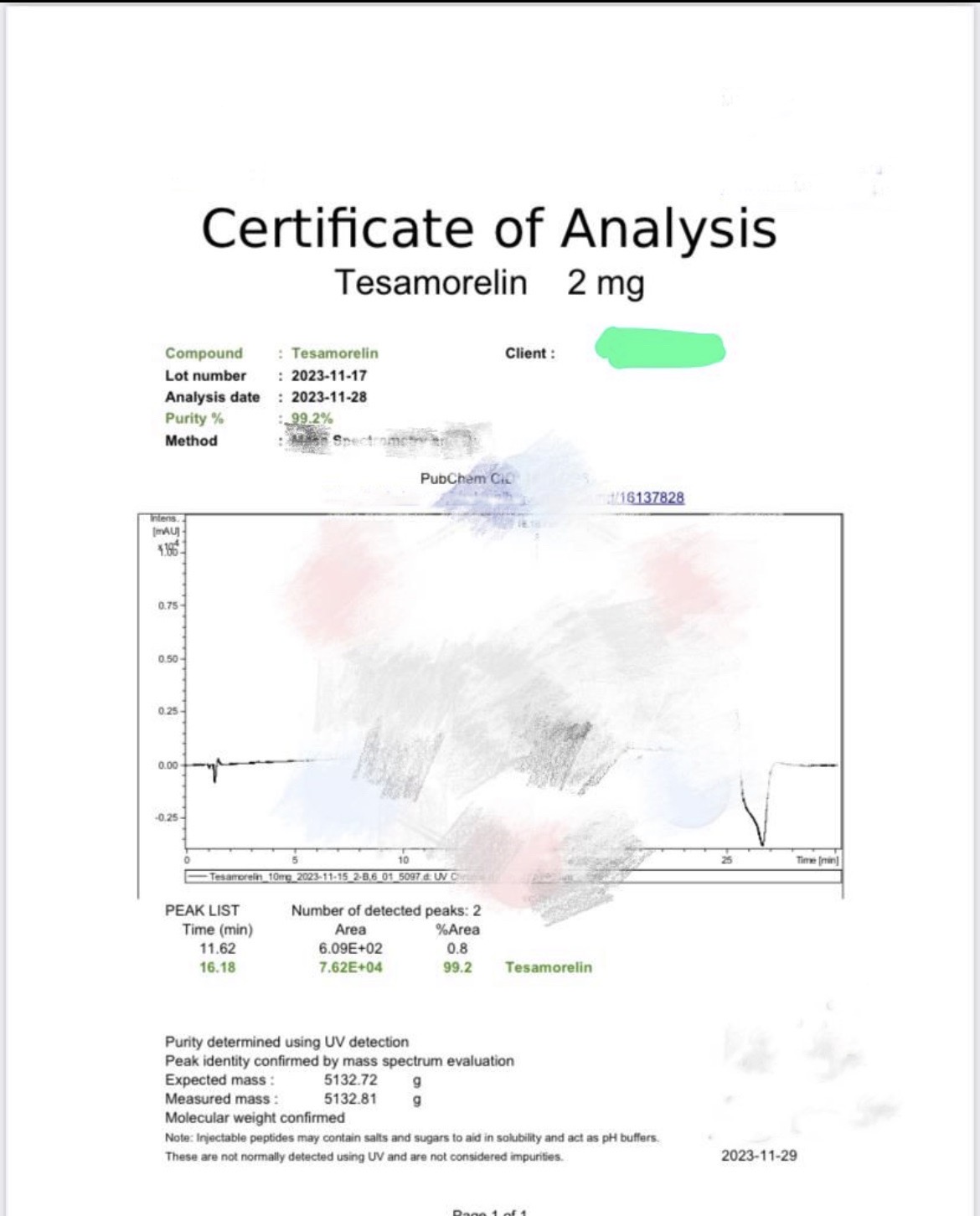Description
Triptorelin (GnRH) Peptide
Triptorelin is a gonadotropin-releasing hormone analog that has been studied within the context of prostate cancer cell development, due to its speculated impact on androgen deprivation. Similar to Luteinizing Hormone-Releasing Hormone, Triptorelin has been suggested to work as an inhibitor, via a synthesis of testosterone and estrogen within long-term research studies. This peptide has also been researched within the context of receptor-positive breast cancer for its potential impacts.
Specifications
OTHER KNOWN TITLES: Decapeptyl, TRP(6)-LHRH, Trelstar, Triptoreline, Decapeptyl, Gonapeptyl
MOLECULAR FORMULA: C64H82N18O13
MOLECULAR WEIGHT: 1311.473 g/mol
SEQUENCE: Pyr-His-Trp-Ser-Tyr-D-Trp-Leu-Arg-Pro-Gly
Triptorelin (GnRH) Research
TRIPTORELIN AND TESTOSTERONE SECRETION
Studies have suggested that Triptorelin may exhibit the potential to rapidly raise testosterone levels, with long-term studies suggesting the peptide may also suppress production after chronic exposure. Scientists report that testosterone flare and has been observed in Triptorelin studies within the first few weeks. This suggests that GnRH, when specific experimental conditions, may potentially raise testosterone levels.
TRIPTORELIN AND GNRH RESEARCH
Triptorelin is classified as an analog of gonadotropin-releasing hormone (GnRH). Researchers posit that the peptide appears to stimulate the anterior pituitary gland to release follicle-stimulating hormone (FSH) and luteinizing hormone (LH). The exact levels of FSH and LH appear to depend on the size and frequency of GnRH pulses and, therefore, on the concentration and frequency of Triptorelin exposure. However, introduction of Triptorelin in a steady-state rather than a pulse may ultimately suppress LH and FSH secretion, and testosterone and estrogen production. Most of the research on Triptorelin focuses on the potential of the peptide to suppress the production of these hormones, particularly in studies within the context of oncology and cancer progression.
TRIPTORELIN AND BREAST CANCER
Hormone suppression has been considered by scientists as a potential cancer cell mitigation method in cancers sensitive to hormone levels. Selective estrogen receptor modulators (SERMs) are currently the most widely recognized substances in this context. SERMs appear to reduce the risk of breast cancer recurrence by approximately 30% – 50% depending on certain criterion in the observed research model. It is also speculated to act to shrink tumor growth, though research has speculated that tumors may become more resistant to SERMs over time. The search for SERM alternatives and excipients has led scientists to investigate the role of Triptorelin in research models of breast cancer.[1] The researchers conclude that “HOBOE study shows that in [research models of] early breast cancer undergoing ovarian function suppression with triptorelin, ZL significantly improves DFS, while worsening compliance and toxicity, as compared with [the SERM substance].” Similar studies also suggest the addition of Triptorelin to SERM exposure in early-stage breast cancer may improve and increase disease control and increase survival rates amongst research models.[2]
TRIPTORELIN AND PROSTATE CANCER
Triptorelin has also been observed in prostate cancer research studies for its speculated growth-inhibiting activity. The peptide has been suggested to impact testosterone levels, with researchers observing that Triptorelin may reduce 10-year mortality to less than 5% in research models of hormone-sensitive prostate cancer.[3] New studies suggest that the combination of Triptorelin and radiation may have exerted the same impact as complete androgen deprivation in research models. In one study, severe symptoms from prostate cancer appeared to be reduced from ~54% to 12% following exposure to Triptorelin peptide.[4] The researchers conclude that “A reduction of LUTS is observed in [research models] with locally advanced or metastatic prostate cancer treated with triptorelin in routine practice. This is in agreement with similar observational studies of triptorelin conducted in other [studies].”
TRIPTORELIN AND ENDOMETRIOSIS
Studies suggest that Triptorelin may help to relieve pain associated with endometriosis by decreasing the number of diseased nodules. Triptorelin has been studied for its potential as a preoperative compound in the case of endometriosis-associated complications.[6] Preliminary animal studies suggest that Triptorelin may improve the outcome of endometriosis laparoscopic surgery.[7] It appeared to be especially impactful with increasing pregnancy rates following surgery. Triptorelin may have a profound effect on models of colorectal endometriosis.
TRIPTORELIN AND IMMUNE FUNCTION
Studies on rats suggest that LHRH may have an integral impact due to its apparent regulatory ability in the thymus and certain aspects of the immune system. Cell aging and low regeneration rates may lead to a decrease in the LHRH agonist binding sites on the Thymus. This may cause the thymus to increase by the 50% over time and also may lead to immunodeficiencies.[8] Exposure to LHRH agonists, such as Triptorelin, have been studied for their potential to improve intrathymic growth and offset the effects of cell aging. The amount of thymus appears to correlate to the immune system’s performance.
Disclaimer: The products mentioned are not intended for human or animal consumption. Research chemicals are intended solely for laboratory experimentation and/or in-vitro testing. Bodily introduction of any sort is strictly prohibited by law. All purchases are limited to licensed researchers and/or qualified professionals. All information shared in this article is for educational purposes only.
References
- Perrone F, De Laurentiis M, De Placido S, Orditura M, Cinieri S, Riccardi F, Ribecco AS, Putzu C, Del Mastro L, Rossi E, Tinessa V, Mosconi AM, Nuzzo F, Di Rella F, Gravina A, Iodice G, Landi G, Pacilio C, Forestieri V, Lauria R, Fabbri A, Ibrahim T, De Maio E, Barni S, Gori S, Simeon V, Arenare L, Daniele G, Piccirillo MC, Normanno N, de Matteis A, Gallo C. Adjuvant zoledronic acid and letrozole plus ovarian function suppression in premenopausal breast cancer: HOBOE phase 3 randomised trial. Eur J Cancer. 2019 Sep;118:178-186. doi: 10.1016/j.ejca.2019.05.004. Epub 2019 Jun 1. PMID: 31164265.
- Frampton JE. Triptorelin: A Review of its Use as an Adjuvant Anticancer Therapy in Early Breast Cancer. Drugs. 2017 Dec;77(18):2037-2048. doi: 10.1007/s40265-017-0849-3. PMID: 29177573.
- Merseburger AS, Hupe MC. An Update on Triptorelin: Current Thinking on Androgen Deprivation Therapy for Prostate Cancer. Adv Ther. 2016 Jul;33(7):1072-93. doi: 10.1007/s12325-016-0351-4. Epub 2016 May 31. PMID: 27246172; PMCID: PMC4939158.
- Hachi K, Boualga K, Chettibi K, Harouni M, Ounnoughene M, Bekkat-Berkani N, Maisonobe P, Yousfi MJ. Étude algérienne des effets bénéfiques de la triptoréline sur les symptômes du bas appareil urinaire chez les patients atteints d’un cancer de la prostate non localisé [Study of the beneficial effects of triptorelin on lower urinary tract symptoms in Algeria in patients with non-localized prostate cancer]. Prog Urol. 2018 Jun;28(8-9):450-459. French. doi: 10.1016/j.purol.2018.03.014. Epub 2018 May 20. PMID: 29789236.
- Del Mastro L, Boni L, Michelotti A, Gamucci T, Olmeo N, Gori S, Giordano M, Garrone O, Pronzato P, Bighin C, Levaggi A, Giraudi S, Cresti N, Magnolfi E, Scotto T, Vecchio C, Venturini M. Effect of the gonadotropin-releasing hormone analogue triptorelin on the occurrence of chemotherapy-induced early menopause in premenopausal women with breast cancer: a randomized trial. JAMA. 2011 Jul 20;306(3):269-76. doi: 10.1001/jama.2011.991. PMID: 21771987.
- Leone Roberti Maggiore U, Scala C, Remorgida V, Venturini PL, Del Deo F, Torella M, Colacurci N, Salvatore S, Ferrari S, Papaleo E, Candiani M, Ferrero S. Triptorelin for the treatment of endometriosis. Expert Opin Pharmacother. 2014 Jun;15(8):1153-79. doi: 10.1517/14656566.2014.916279. PMID: 24832495.
- Xue H, Liu M, Hao W, Li Y. Clinical evaluation of laparoscopic surgery combined with triptorelin acetate in patients with endometriosis and infertility. Pak J Med Sci. 2018 Sep-Oct;34(5):1064-1069. doi: 10.12669/pjms.345.15574. PMID: 30344551; PMCID: PMC6191787.
- Marchetti B, Guarcello V, Morale MC, Bartoloni G, Raiti F, Palumbo G Jr, Farinella Z, Cordaro S, Scapagnini U. Luteinizing hormone-releasing hormone (LHRH) agonist restoration of age-associated decline of thymus weight, thymic LHRH receptors, and thymocyte proliferative capacity. Endocrinology. 1989 Aug;125(2):1037-45. doi: 10.1210/endo-125-2-1037. PMID: 2546733.



Reviews
There are no reviews yet.